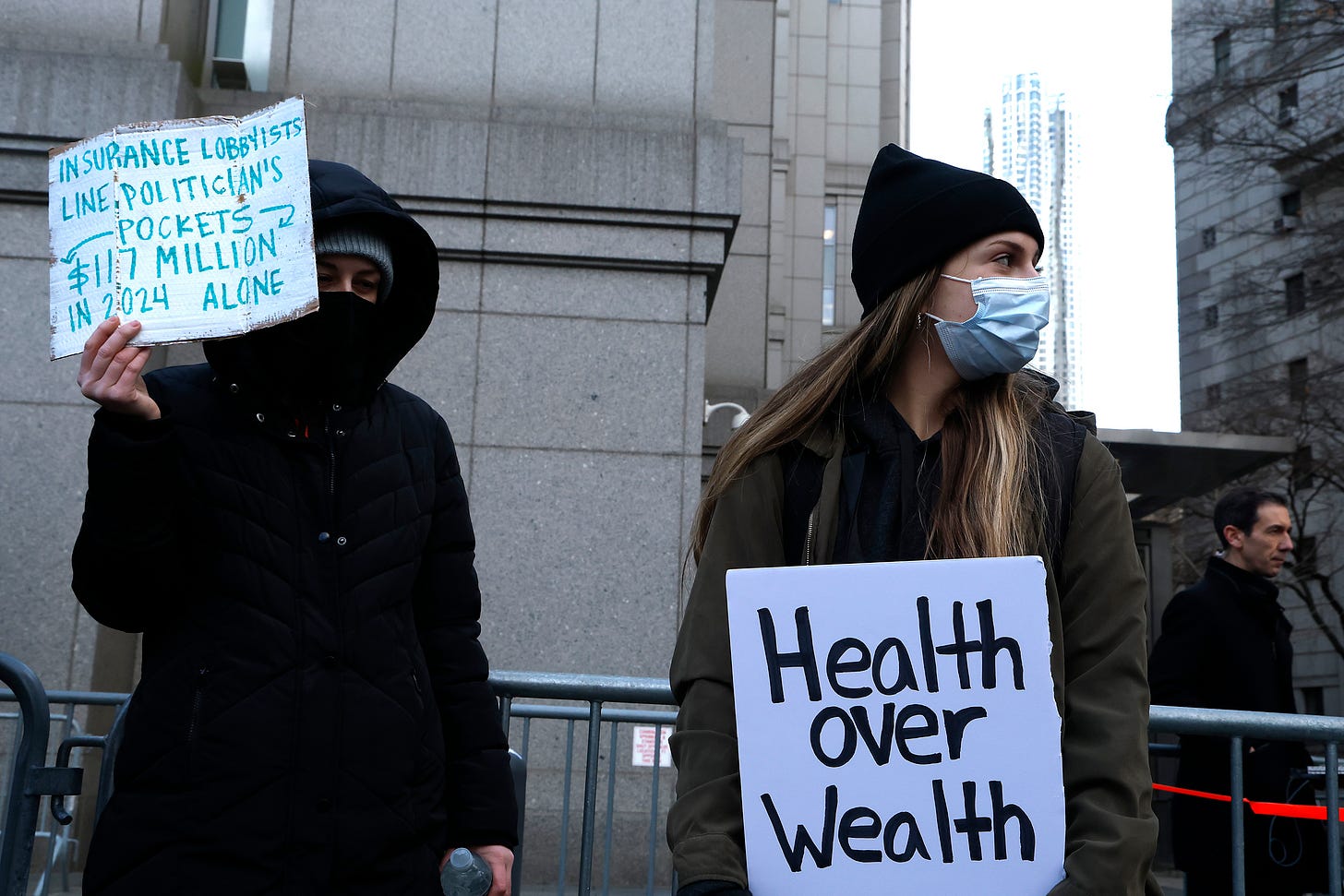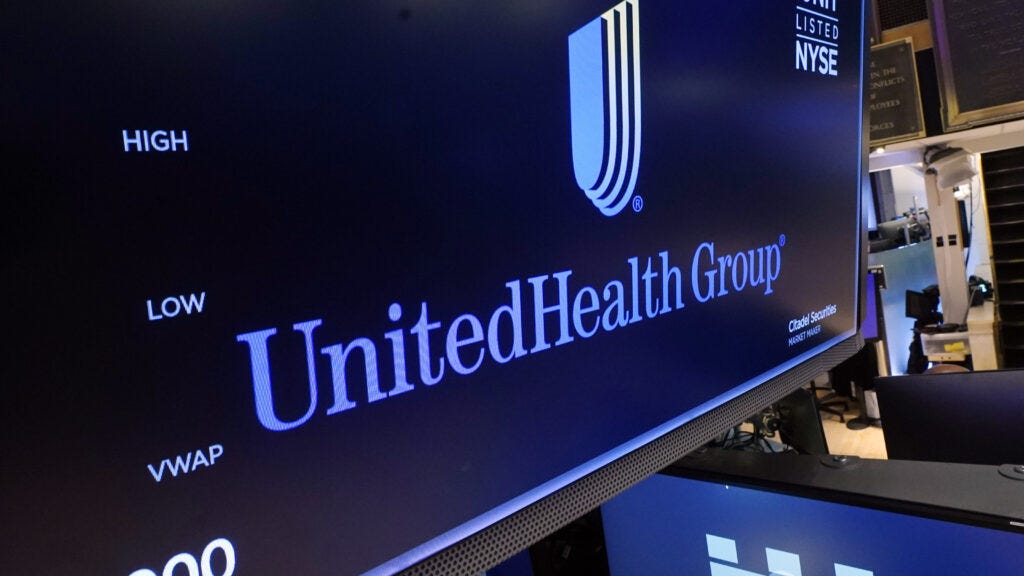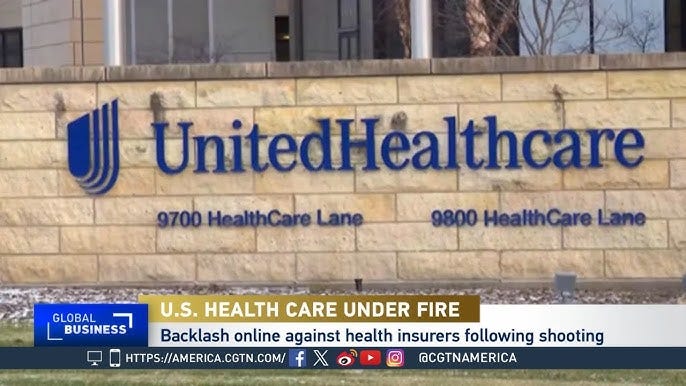UnitedHealthcare’s Money Defeats Luigi Mangione’s Violence:
Trump’s “big, beautiful bill” is the ultimate win for UnitedHealth Group and the American health insurance industry.
Luigi Mangione was taken to the Blair County Courthouse in Hollidaysburg on December 10th after his arrest in Pennsylvania. The photograph is courtesy of Benjamin B. Braun and the Pittsburgh Post-Gazette.
Multiple times, Public Health Policy Reviews have claimed that the killing of UnitedHealthcare CEO Brian Thompson by Luigi Mangione on December 4th, 2024, signifies a turning point in the realm of privatized health care in the United States.
Our last essay on the death of Brian Thompson, published on June 23rd, 2025, focused on the widespread American public frustration and outrage towards UnitedHealthcare, the broader private healthcare insurance sector, and corporate healthcare practices, which was so strong that it was tangible.
**********
Florida mother and housewife Briana Boston, following her arrest. Boston was arrested after allegedly making perceived threats directed at her health insurance company. The photograph is courtesy of the Lakeland Police Department.
National corporate media companies and news programs were shocked by the level of anger from regular US citizens, such as Briana Boston, toward the healthcare insurance industry and corporate healthcare practices.
Those corporate insurance practices include:
Using artificial intelligence (AI) driven claims assessments that deny individuals access to healthcare at the rate of hundreds of cases per minute.
Insurance companies are denying coverage for recommended care by considering services medically unnecessary or provided in unsuitable settings, leading to delays and frustration for both patients and healthcare providers.
Prior authorization requirements imposed by insurance companies on healthcare practitioners necessitate pre-approval for specific treatments, resulting in delays and potential denials of necessary care.
High deductibles and copays shift a significant portion of the cost burden onto patients, making essential services unaffordable for many.
**********
President Donald Trump, alongside Republican lawmakers, signs the One Big Beautiful Bill Act into law at an Independence Day military family picnic on the South Lawn of the White House on July 4th, 2025, in Washington, DC. The image is credited to Samuel Corum and Getty Images.
However, Last week’s furious legislative debate over President Donald Trump’s “One Big Beautiful Bill” (OBBB) highlights the influence of the private health insurance lobby over the American political system.
The OBBB legislation, signed on Independence Day by President Trump, narrowly cleared the Senate and the House of Representatives with few Republican (GOP) defections, benefits the wealthy and hurts lower-income Americans.
The bill contains the most significant cut to Medicaid and food assistance programs for the poor in US history. During a July 4th signing ceremony of the OBBB at the White House, Mr. Trump said, “We made promises, and it’s really promises made, promises kept.”
House Minority Leader Hakeem Jeffries (D-NY) led complete opposition to the OBBB from Congressional Democrats during a marathon address that broke the record for the longest House speech.
“I rise today in strong opposition to Donald Trump’s disgusting abomination… that guts Medicaid, rips food from the mouths of children, seniors, and veterans, and rewards billionaires with massive tax breaks,” said Jeffries.
**********
People protesting the healthcare industry gather outside the Federal Criminal Court as Luigi Mangione, a suspect in the shooting death of UnitedHealthcare CEO Brian Thompson, appears during an arraignment hearing on December 19th, 2024, in New York City. The photograph is courtesy of John Lamparski and Getty Images.
One month ago, we continued our trend of connecting corporate America to President Donald Trump’s Project 2025 policies with our article, “The Health Insurance Backlash Will Continue to Grow.”
That essay revealed how there is no national media focus on the fact that the health insurance industry and companies like UnitedHealthcare contributed over $24.6 million in campaign donations to congressional candidates from both major political parties during the 2023-2024 election cycle.
Health insurance political action committees (PACs) spent $13,825,782 on Republicans and $10,698,078 on Democrats last year. What have health insurance companies received for their money?
In February 2022, the US Department of Justice (DOJ) filed a federal lawsuit to challenge a $8 billion all-cash deal corporate merger between UnitedHealth and Change Healthcare, citing antitrust concerns.
UnitedHealth Group, the parent company of UnitedHealthcare, later convinced the federal courts that there is adequate separation between the payment business of Change Healthcare and UnitedHealth Group’s health plan business.
**********
The photograph of the UnitedHealth business logo is courtesy of Richard Drew and the Associated Press (AP).
In 2024 and 2025, the health insurance PACs bribed Trump, the GOP, and “moderate” Democrats into backing federal laws that would remove regulations overseeing business monopolies and anti-competitive practices.
With last week’s passage of President Trump’s “big, beautiful bill,” UnitedHealth Group, Change Healthcare, and companies like Optum and Blue Cross-Blue Shield have finally succeeded. What will the success of the health insurance PACs mean for average American health care consumers?
The OBBB’s deep cuts to multiple social programs, including SNAP and Medicaid, will only exacerbate the outsized social scourge of medical debt in the United States. Trump and the GOP reduced Medicaid funding by $1 trillion over ten years through more frequent eligibility checks, work requirements, and other policy changes.
Thirty-one million Americans, or twelve percent of the adult population, were forced to borrow up to $74 billion last year to obtain medical care. The most recent numbers indicate that US residents currently owe at least $220 billion in medical debt.
**********
The video screen grab is courtesy of CGTN America.
UnitedHealth Group, Blue Cross-Blue Shield, and other private health insurance conglomerates are seeking to supplant the role of the Affordable Care Act (ACA or “Obamacare”), Medicaid, and Medicare as the nation’s primary healthcare providers.
In the near future, UnitedHealthcare “customers” could feasibly be forced to rely on the private company for health insurance, seeing doctors affiliated with Optum Health, having prescriptions covered by Optum, and paying medical bills using Optum Pay technology.
Now, you see just one of the ultimate aims and costs of Donald Trump’s “big, beautiful bill,” which will cause 11.8 million Americans to lose their health care by 2034, according to the Congressional Budget Office.









